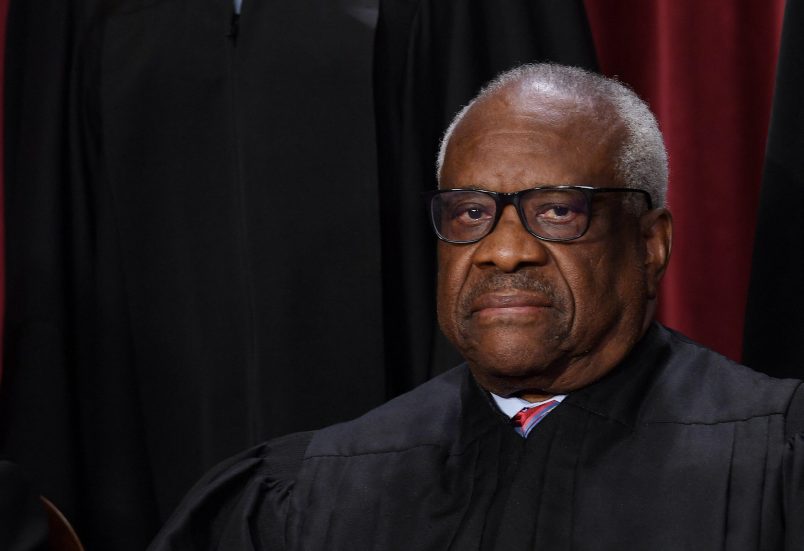The Supreme Court ruled Friday that individuals who pose a “credible threat to the physical safety of another” may be stripped of their guns, showing that even its extremely expansive reading of the Second Amendment stops short of letting a proven domestic abuser carry arms.
Chief Justice John Roberts wrote for the majority, joined by every justice except — shockingly — Justice Clarence Thomas. Justice Sonia Sotomayor also wrote a concurrence, joined by Justice Elena Kagan. Justices Neil Gorsuch, Brett Kavanaugh, Amy Coney Barrett and Ketanji Brown Jackson all wrote separate concurring decisions.
Roberts put some, if very modest, guardrails on the Bruen decision from 2022, when Thomas, writing for the majority, knocked down a century-old New York gun licensing law because it lacked a historical analogue from the country’s founding. Taking that logic to its natural conclusion, Zackey Rahimi argued that there was certainly no founding-era analogue to stripping domestic abusers like him of their firearms — an obvious truth in a time when the most powerful and wealthy white women were considered far less than full citizens.
“The Second Amendment permits more than just regulations identical to those existing in 1791,” Roberts wrote, saying that “the Court’s conclusion in Bruen that regulations like the surety laws are not a proper historical analogue for a broad gun licensing regime does not mean that they cannot be an appropriate analogue for a narrow one.”
“Holding otherwise would be as mistaken as applying the protections of the right only to muskets and sabers,” he added.
The ruling was yet another smack on the wrist for the Fifth Circuit, as Roberts took pains to explain the twofold way the circuit court had erred. The Supreme Court reversing the Fifth Circuit has been a theme this term — less a sign of the high court’s moderation, and more of the Fifth’s right-wing extremity.
“For its part, the Fifth Circuit made two errors. First, like the dissent, it read Bruen to require a ‘historical twin’ rather than a ‘historical analogue,’” Roberts wrote. “Second, it did not correctly apply our precedents governing facial challenges.”
In his lone dissent, Thomas chastises the rest of the Court, including the conservatives who joined him in Bruen: They all read his decision wrong, he wrote, which does require something closer to a historical twin than a cousin in upholding gun regulations.
He spent pages railing against the government’s interpretation that all unfit or dangerous people should be stripped of their guns, equating it to a tyrannical stomping on a sanctified right.
“While Congress cannot revive disarmament laws based on race, one can easily imagine a world where political minorities or those with disfavored cultural views are deemed the next ‘dangers’ to society,” he wrote, clearly imagining, with a shudder, his MAGA allies being disarmed.
Sotomayor, joined by Kagan, wrote to both cheer the Chief’s looser approach to Bruen and to make explicit that Thomas’ approach to gun regulations would moot nearly all of them if they lack a beat-for-beat founding-era predecessor.
She also made a concise liberal argument against originalism: How can our interpretation of the Constitution and statutory regimes be guided by a philosophy grounded in a time when only certain white men were entitled to their protections?
“History has a role to play in Second Amendment analysis, but a rigid adherence to history, (particularly history predating the inclusion of women and people of color as full members of the polity), impoverishes constitutional interpretation and hamstrings our democracy,” Sotomayor argued.
Barrett more anxiously seconds the majority’s wider approach to historical analogues, though added that “harder level-of-generality problems can await another day.”
Gorsuch wrote essentially a rebuttal to Sotomayor and Kagan, a glowing endorsement of originalism as the gold standard in constitutional interpretation: “Faithful adherence to the Constitution’s original meaning may be an imperfect guide, but I can think of no more perfect one for us to follow,” he simpered.
Kavanaugh joined in in his own concurrence, waxing that “the Constitution is a document of majestic specificity with ‘strikingly clean prose.’”
Gorsuch also emphasized the narrowness of the decision, leaving the door open to future rulings on whether the government can disarm someone without a judicial finding that he poses a credible threat, whether someone can be disarmed permanently or whether someone can be punished for using his gun in self defense (this last, he claims ominously, has historical roots indicating that even someone shown to be a credible threat can use his guns for self defense).
This Court, he made clear, is not giving up its radicalism on gun rights just because this case made the justices squeamish.
Buried in Kavanaugh’s pages-long ode to originalism — peppered with sucking up to various conservative justices, including Roberts — is a worrying contention that heightened scrutiny is a fairly recent invention that doesn’t hold much weight and should not be expanded. Strict scrutiny, the highest of these, is often invoked in equal protection claims, and meant to guard against laws that infringe on fundamental rights, or that involve classifications like race or national origin.
Jackson wrote to criticize all of the Court’s recent Second Amendment decisions, and to point out that forcing lower courts — who lack expertise and time — to cobble together historical analogues has proven unworkable and chaotic.
“The message that lower courts are sending now in Second Amendment cases could not be clearer,” she wrote. “They say there is little method to Bruen’s madness.”
She added that legislatures deserve to know whether their gun regulations will pass constitutional muster, and to be able to depend on consistent rulings that point the way.
Read the ruling here:







Clarence Thomas: as predictable as he is vile.
Uncle Thomas would vote for the restoration of Slavery.
Sorry, kitteh. No gunz for yew!
I had no idea Harlan Crow owned a firearm manufacturing company.
Transl.: Bruen was stupid. We regert the erra.